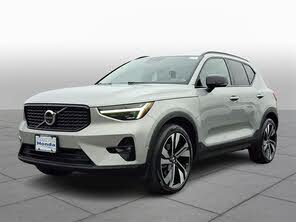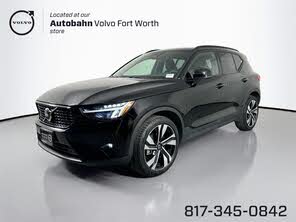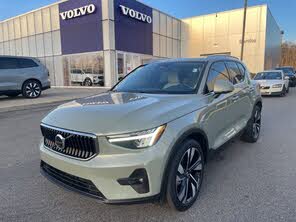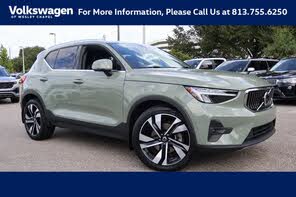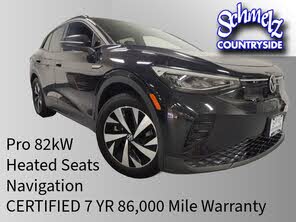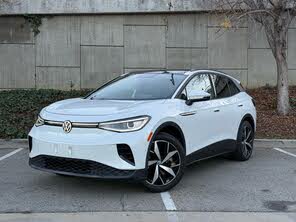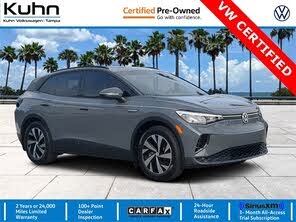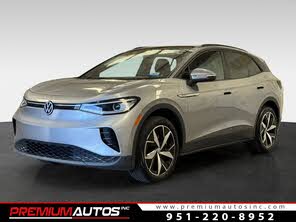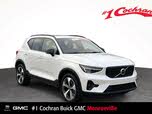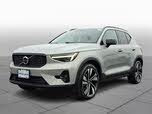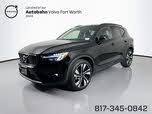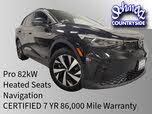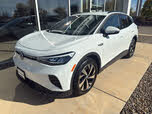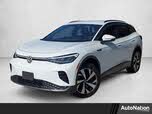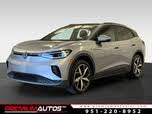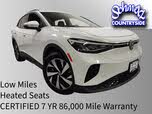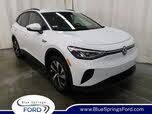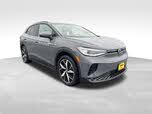2023 Volvo XC40 vs 2023 Volkswagen ID.4
Overview | |
MSRP$36,350 | MSRP$38,995 |
Listings436 | Listings610 |
Ratings & Reviews | |
User Reviews | User Reviews |
Expert reviews7.5 out of 10 | Expert reviews7.8 out of 10 |
Pros
Cons
| Pros
Cons
|
2023 Volvo XC40 Reviews SummaryIn Volvo speak, “40” denotes an entry-level model. While the Swedish automaker no longer rosters the S40 sedan or V40 wagon in the United States, the XC40 subcompact crossover remains to compete with the likes of the Audi Q3, BMW X1, Lexus UX, and Mercedes-Benz GLA-Class for aspiring luxury-car owners’ dollars. The XC40 was unveiled in 2017, arriving in the U.S. as a 2019 model, and hasn’t undergone a redesign since. An all-electric Volvo XC40 Recharge variant joined the lineup as a 2021 model. Volvo’s other current EV, the C40 Recharge, is also broadly similar to the XC40 models, but with a coupe-like body style. For 2023, Volvo gave the XC40 several notable updates, including new mild-hybrid powertrains, revised styling, and the Android-based infotainment system previously seen on the XC40 Recharge and other Volvo models. The mild-hybrid lineup includes base Core, mid-level Plus, and top Ultimate trim levels, with B4 front-wheel drive (FWD) and B5 all-wheel drive (AWD) drivetrains. This Volvo XC40 review is based on the Ultimate trim in B5 AWD spec. | |
2023 Volkswagen ID.4 Reviews SummaryThe Volkswagen ID.4 is still relatively new to the marketplace (it debuted for the 2021 model year) but VW is already making some important updates to keep it competitive and fulfill goals set when this compact electric SUV first launched. The 2023 Volkswagen ID.4 adds a new base model and a smaller 62-kilowatt-hour battery pack alongside the carryover 82-kWh to increase affordability. VW will also begin sourcing cars for its United States dealerships from the same Chattanooga, Tennessee, factory that builds the gasoline-powered Atlas and Atlas Cross Sport. The automaker has been discussing this since the ID.4 was unveiled, but at first cars for the U.S. came from Zwickau, Germany. The 2023 ID.4 retains single-motor rear-wheel drive (RWD) and dual-motor all-wheel drive (AWD) powertrain options, but gets revised exterior and interior styling, some software changes, and a few more standard tech features and driver aids. The new-for-2023 base model is dubbed ID.4 Standard, slotting below the ID.4 S, ID.4 Pro, ID.4 Pro S, and ID.4 Pro S Plus trim levels (the Pro S Plus replaces the Gradient appearance package from previous model years). We recently spent a day driving a Pro S AWD model from Nashville to Chattanooga, along with a shorter drive in an ID.4 Standard model. | |
No video found | No video found |
Popular Features & Specs | |
Engine2.0L 194 hp I4 | Engine201 hp Electric |
Drive TrainFWD | Drive TrainRWD |
Seating Capacity5 | Seating Capacity5 |
Horsepower194 hp @ 4800 rpm | Horsepower |
EV Battery Capacity | EV Battery Capacity62 kWh |
MPG City24 | MPG City115 |
MPG Highway32 | MPG Highway99 |
Engine | |
Engine Name2.0L 194 hp I4 | Engine Name201 hp Electric |
Torque221 lb-ft @ 1500 rpm | Torque |
Horsepower194 hp @ 4800 rpm | Horsepower |
DrivetrainFWD | DrivetrainRWD |
Fuel Economy | |
EV Battery Capacity | EV Battery Capacity62 kWh |
MPG City24 | MPG City115 |
MPG Highway32 | MPG Highway99 |
Interior | |
Leather SeatsStandard | Leather Seats |
Seating Capacity5 | Seating Capacity5 |
Key Features | |
Navigation SystemStandard | Navigation SystemStandard |
Safety | |
Front Crash Overall5 | Front Crash Overall5 |
Side Crash Overall5 | Side Crash Overall5 |
Dimensions & Capacity | |
Cargo Space21.7 cu ft | Cargo Space30.3 cu ft |
Curb Weight3726 lbs | Curb Weight4317 lbs |
Height65.2 in | Height64.5 in |
Length174.8 in | Length180.5 in |
Width80.1 in | Width83.0 in |
Wheelbase106.4 in | Wheelbase108.9 in |
Maximum Payload925 lbs | Maximum Payload959 lbs |
Number of doors4 | Number of doors4 |
Maximum Towing Capacity3500 lbs | Maximum Towing Capacity |
Overview | ||
MSRP | $36,350 | $38,995 |
Listings | ||
Ratings & Reviews | ||
User reviews | ||
Expert reviews | 7.5 out of 10Read full review | 7.8 out of 10Read full review |
Pros & cons | Pros
Cons
| Pros
Cons
|
Summary | In Volvo speak, “40” denotes an entry-level model. While the Swedish automaker no longer rosters the S40 sedan or V40 wagon in the United States, the XC40 subcompact crossover remains to compete with the likes of the Audi Q3, BMW X1, Lexus UX, and Mercedes-Benz GLA-Class for aspiring luxury-car owners’ dollars. The XC40 was unveiled in 2017, arriving in the U.S. as a 2019 model, and hasn’t undergone a redesign since. An all-electric Volvo XC40 Recharge variant joined the lineup as a 2021 model. Volvo’s other current EV, the C40 Recharge, is also broadly similar to the XC40 models, but with a coupe-like body style. For 2023, Volvo gave the XC40 several notable updates, including new mild-hybrid powertrains, revised styling, and the Android-based infotainment system previously seen on the XC40 Recharge and other Volvo models. The mild-hybrid lineup includes base Core, mid-level Plus, and top Ultimate trim levels, with B4 front-wheel drive (FWD) and B5 all-wheel drive (AWD) drivetrains. This Volvo XC40 review is based on the Ultimate trim in B5 AWD spec. | The Volkswagen ID.4 is still relatively new to the marketplace (it debuted for the 2021 model year) but VW is already making some important updates to keep it competitive and fulfill goals set when this compact electric SUV first launched. The 2023 Volkswagen ID.4 adds a new base model and a smaller 62-kilowatt-hour battery pack alongside the carryover 82-kWh to increase affordability. VW will also begin sourcing cars for its United States dealerships from the same Chattanooga, Tennessee, factory that builds the gasoline-powered Atlas and Atlas Cross Sport. The automaker has been discussing this since the ID.4 was unveiled, but at first cars for the U.S. came from Zwickau, Germany. The 2023 ID.4 retains single-motor rear-wheel drive (RWD) and dual-motor all-wheel drive (AWD) powertrain options, but gets revised exterior and interior styling, some software changes, and a few more standard tech features and driver aids. The new-for-2023 base model is dubbed ID.4 Standard, slotting below the ID.4 S, ID.4 Pro, ID.4 Pro S, and ID.4 Pro S Plus trim levels (the Pro S Plus replaces the Gradient appearance package from previous model years). We recently spent a day driving a Pro S AWD model from Nashville to Chattanooga, along with a shorter drive in an ID.4 Standard model. |
Video | No video found | No video found |
Popular Features & Specs | ||
Engine | 2.0L 194 hp I4 | 201 hp Electric |
Drive Train | FWD | RWD |
Seating Capacity | 5 | 5 |
Horsepower | 194 hp @ 4800 rpm | |
EV Battery Capacity | 62 kWh | |
MPG City | 24 | 115 |
MPG Highway | 32 | 99 |
Engine | ||
Engine Name | 2.0L 194 hp I4 | 201 hp Electric |
Torque | 221 lb-ft @ 1500 rpm | |
Horsepower | 194 hp @ 4800 rpm | |
Drivetrain | FWD | RWD |
Fuel Economy | ||
EV Battery Capacity | 62 kWh | |
MPG City | 24 | 115 |
MPG Highway | 32 | 99 |
Interior | ||
Leather Seats | Standard | |
Seating Capacity | 5 | 5 |
Key Features | ||
Navigation System | Standard | Standard |
Safety | ||
Front Crash Overall | 5 | 5 |
Side Crash Overall | 5 | 5 |
Dimensions & Capacity | ||
Cargo Space | 21.7 cu ft | 30.3 cu ft |
Curb Weight | 3726 lbs | 4317 lbs |
Height | 65.2 in | 64.5 in |
Length | 174.8 in | 180.5 in |
Width | 80.1 in | 83.0 in |
Wheelbase | 106.4 in | 108.9 in |
Maximum Payload | 925 lbs | 959 lbs |
Number of doors | 4 | 4 |
Maximum Towing Capacity | 3500 lbs | |
The 2023 Volvo XC40's exterior had an appealing, distinctive blend of Volvo’s current design philosophy with a strong, flat-roofed SUV profile. Its clean exterior lacked unnecessary detailing, staying true to Volvo’s commitment to sleek design. For models equipped with gasoline engines, tailpipes were hidden to promote the automaker's pro-electrification ethos, with fog lights standard on the Plus and Ultimate models.
In 2023, Volvo introduced some subtle changes to the XC40’s exterior. The “Thor’s Hammer” headlights had a new pixelated design, the front bumper adopted a more angular look, and the wheel designs were updated. However, these changes were minor enough that even existing XC40 owners would need to take a closer look to spot them. Identifying the XC40 Recharge became easier due to its new sealed-off grille from the C40 Recharge.
The XC40 shared its Compact Modular Architecture (CMA) platform with the Volvo C40 Recharge and the Polestar 2 electric vehicles, making it the only CMA-based model in the U.S. available with a combustion engine.
Inside, the XC40 maintained its minimalist design, with thin air vents framing the central touchscreen and scalloped elements housing door handles and speaker grilles. Standard features included dual-zone automatic climate control and optional air purifier. The Recharge models featured vegan leather upholstery, while leather was available for the gasoline versions. The Ultimate test model boasted luxurious options like a panoramic moonroof and an Orrefors crystal shift knob. However, the all-black interior hinted at a utilitarian design. Although the fit and finish were solid, some of the materials reminded us that the XC40 was still an entry-level model.
Similarly, the 2023 Volkswagen ID.4 received some mild styling adjustments for the new model year. Gloss black trim on the front bumper and a more squared-off rear bumper design aimed to improve aerodynamics. All wheel designs and colors were fresh for 2023, and the rear VW logo now had the added charm of illumination.
The ID.4’s EV nature was unmistakable against VW’s gasoline models. Notably, it lacked the upright profile and increased ground clearance typical of traditional SUVs—a potential weak point given that these features attract most SUV buyers. Yet, this seemed a shared trait among many contemporary EVs, such as the Chevrolet Bolt EUV, which closely resembled its hatchback sibling, the Bolt EV.
Built on VW’s MEB platform tailored specifically for EVs, the ID.4's architecture allowed for modularity across several models. This was essentially the electric equivalent of VW’s MQB platform, which underpinned a wide range of models from the Atlas to the Jetta. The forthcoming MEB-based ID.Buzz electric van, arriving in 2024, was also part of this lineup.
The ID.4’s interior echoed the minimalist yet high-quality design of VW’s recent gasoline models. This was evident even in the base ID.4 Standard model, where the only notable downgrade was a manual driver’s seat. Leatherette upholstery with recycled fibers for seat and door-panel inserts became standard for 2023.
















For the 2023 model year, Volvo XC40 introduced mild-hybrid powertrains, featuring a 48-volt electrical system and a 13-horsepower integrated starter generator. These new setups assisted the gasoline engine, increasing the efficiency of the start/stop system for better fuel economy and smoother power delivery.
There were two versions of this system for the 2023 XC40. The base B4 powertrain combined the mild-hybrid system with a 2.0-liter turbocharged four-cylinder engine, generating 197 hp and 221 pound-feet of torque. The B5 model boasted a more powerful 2.0-liter turbo-four engine producing 247 hp and 258 pound-feet of torque. An eight-speed automatic transmission was standard for both setups, with the B4 being FWD-only and the B5 AWD-only.
Volvo claimed that the B4 and B5 models could accelerate from 0 to 60 mph in 8.1 seconds and 6.1 seconds, respectively, outperforming similar Audi Q3 versions. In our tests, the B5 model exhibited decent speed, though the accelerator pedal required extra initial pressure, making smooth starts tricky. Once moving, the blend of electric assistance and turbocharged boost ensured ample power. True to Volvo’s safety-first philosophy, the XC40 was electronically limited to a top speed of 112 mph.
The driving experience of the XC40 was notably refined. It might not have been sporty, but it took corners gracefully and absorbed road bumps like more expensive vehicles. This tuning provided a serene drive, making it feel superior to similarly sized crossovers from mainstream brands like Hyundai, Toyota, and Volkswagen. While there was no sports mode, an option to increase steering firmness was included, which we found made minor corrections harder.
The XC40 Recharge added more vigor with its two electric motors producing a combined 402 hp and 486 pound-feet of torque, achieving 0 to 60 mph in a swift 4.7 seconds. Its EPA-rated range was 223 miles, and it could tow up to 4,409 pounds, surpassing the gasoline-powered XC40’s maximum of 3,500 pounds.
In comparison, the 2023 Volkswagen ID.4 came with a new 62-kWh battery pack for the Standard and S models, available only in RWD. The Pro, Pro S, and Pro S Plus models got the carryover 82-kWh pack and were available in both RWD and AWD.
The single-motor RWD models produced 201 horsepower and 229 pound-feet of torque. In contrast, dual-motor AWD models offered 295 hp and 339 pound-feet of torque, enabling 0 to 60 mph in 5.7 seconds.
Volkswagen estimated the smaller battery pack reduced curb weight by 240 pounds, enhancing acceleration and handling. The 62-kWh ID.4 Standard felt notably spry during short city drives, though more testing was needed to compare it with its larger-battery RWD counterpart. Still, it didn’t feel like a step down in driving dynamics.
With AWD, the ID.4 had the acceleration to rival performance cars like VW’s Golf GTI and Golf R. However, its handling fell short, allowing too much body roll on twisty roads. Though it provided a comfortable and refined drive for long distances, it wasn’t particularly engaging on challenging routes.
The ID.4’s regenerative braking setup was different from traditional one-pedal driving, allowing for coasting in its default setting and stopping short of one-pedal functionality even in its more aggressive “B” mode. This might have been a letdown for some EV enthusiasts, but it offered a more conventional experience for new EV drivers.
Though marketed as SUVs, the Volvo XC40 and its competitors remained relatively compact, better suited to individual commuting than family carpools. For more practicality, Volvo’s larger XC60 and XC90 crossovers, or their V60 and V90 wagon counterparts, were preferable options.
Among its peers, the XC40 had a reasonably spacious interior. It had comparable rear-seat headroom to the redesigned 2023 BMW X1 and slightly less front-seat headroom than the Mercedes-Benz GLA-Class. Legroom was average, but generous shoulder room gave a sense of greater space and allowed more practical use of the second-row middle seat.
The XC40 offered 20 cubic feet of cargo space with the rear seats up and up to 46.9 cubic feet with the seats folded, which was less than what the BMW X1 and Audi Q3 provided. Nonetheless, it came with a standard power tailgate and keyless entry on Plus and Ultimate trims.
The interior storage solutions of the XC40 were commendable. The carved-out door panels, although visually appealing, created more storage flexibility, accommodating bottles and handbags. Additionally, the center console storage bin and phone tray were sizable given the cabin’s dimensions.
In comparison, the Volkswagen ID.4 lived up to its SUV label with more interior space than other affordable EVs. It boasted more front and rear seat legroom than the Chevrolet Bolt EV or Nissan Leaf and more headroom than the new 2023 Kia Niro EV.
Cargo-wise, the ID.4 provided 30.3 cubic feet with the rear seats up and 64.2 cubic feet with the seats folded. While it fell short of gasoline crossovers like the Honda CR-V and Toyota RAV4 in terms of interior space, it was the SUV of affordable EVs in terms of practicality.
The ID.4 also addressed towing needs, though not to the extent of traditional SUVs. Its towing capacity was 2,200 pounds for RWD and 2,700 pounds for AWD models.
For 2023, VW enhanced the ID.4’s interior functionality. The center console received a conventional lid in place of the earlier sliding cover, along with a better phone placement area between the cupholders and storage bin. A three-zone climate control system with rear-seat controls and heated outboard rear seats also became available.
For 2023, the gasoline-powered 2023 Volvo XC40 adopted the Android-based infotainment system previously introduced on the XC40 Recharge in 2021. This system used Google apps—Google Maps for navigation, Google Assistant for voice control, etc.—functioning similarly to Android Auto but integrated continuously. Apple CarPlay and Bluetooth support were also included.
Standard features included a 12.3-inch digital instrument cluster and a 9-inch touchscreen in Volvo’s characteristic portrait layout. The B5 Ultimate model we reviewed came equipped with a 13-speaker Harman Kardon premium audio system with an air-ventilated subwoofer, and a pair of USB-C ports for each row.
Our test experience with the system found it effective, though users preferring Apple products might not enjoy it as much. The absence of analog controls, except for a volume knob, meant the touchscreen handled nearly all functions. While visually clean, it made simple tasks like activating seat heaters or managing driver-assist features more cumbersome.
For 2023, Volkswagen’s ID.4 upgraded its formerly optional 12.0-inch touchscreen to a standard feature, replacing the previous 10.0-inch screen on lower trims. The infotainment system also received software updates for better responsiveness, while wireless Apple CarPlay and Android Auto, along with the ID.Cockpit digital instrument cluster, remained standard.
Despite these updates, the user experience of the infotainment system retained both its strengths and weaknesses. Sharp graphics and intuitive commands made using the system easy. However, the haptic touchpads on the dashboard and steering wheel often proved distracting, lacking physical feedback when pressed. Thankfully, the effective natural-language voice recognition often rendered these touchpads unnecessary.
One intriguing carryover feature was ID.Light, which mixed ambient lighting with AI assistance. It illuminated different colors based on drive mode and provided visual cues for navigation, although it sometimes melded into the background of other alerts and warnings from the driver aids.
Volvo's established reputation for safety reflected in the XC40’s extensive list of standard features. Unlike many luxury brands that skimped on safety, the XC40 included standard lane keep assist, automatic emergency braking, Oncoming Lane Mitigation, traffic sign recognition, rear parking sensors, blind-spot monitoring, and rear cross-traffic alert. Front seats designed to prevent whiplash were also standard.
Upgrading to the Plus trim added front parking sensors, while the Ultimate trim included side parking sensors, a 360-degree camera system, adaptive cruise control, and Pilot Assist—a hands-on system capable of controlling highway steering, acceleration, and braking. The lack of standard adaptive cruise control in the base trim was notable, as most competitors did not include it either, which was somewhat surprising from a safety-centric brand like Volvo.
Pilot Assist in the XC40 did not offer significantly more functionality than similar systems from non-luxury rivals. Although it executed automated lane centering more smoothly, it had a tendency to favor the lane’s right side. Additionally, the 360-degree camera view had a fisheye effect that was less practical.
The Insurance Institute for Highway Safety (IIHS) awarded the 2023 XC40 top “Good” ratings in most crash tests but rated it “Acceptable” in the updated side-impact test. The vehicle received “Superior” and “Advanced” ratings for front crash prevention tech in vehicle-to-vehicle and daytime vehicle-to-pedestrian tests, respectively, and an “Acceptable” rating for child seat anchor ease of use. The National Highway Traffic Safety Administration (NHTSA) gave the gasoline XC40 a five-star overall safety rating, comprising five stars in frontal and side crash tests and a four-star rollover rating.
The 2023 Volkswagen ID.4 achieved a five-star overall safety rating from the NHTSA, with five stars each in frontal and side crash tests and four stars in rollover crash tests. While the IIHS hadn't released crash-test ratings for the 2023 ID.4, the 2022 model garnered the highest "Top Safety Pick+" rating, including top “Good” scores in all crash tests, a "Superior" rating for vehicle-to-vehicle front crash prevention, and an "Advanced" rating for vehicle-to-pedestrian collision prevention. The only downside was an "Average" score for the standard headlights.
Standard driver-assist features for the ID.4 included forward collision warning, automatic emergency braking with pedestrian and cyclist detection, blind-spot monitoring, rear park distance control, automatic high beams, traffic-sign recognition, and VW’s Travel Assist 2.0. Emergency Assist 3.0, which automatically pulls over the vehicle if the driver is incapacitated, and Park Assist Plus automated parking were new additions. The ID.4 also included an advanced lane-change feature and a 360-degree camera system.
CarGurus highlights
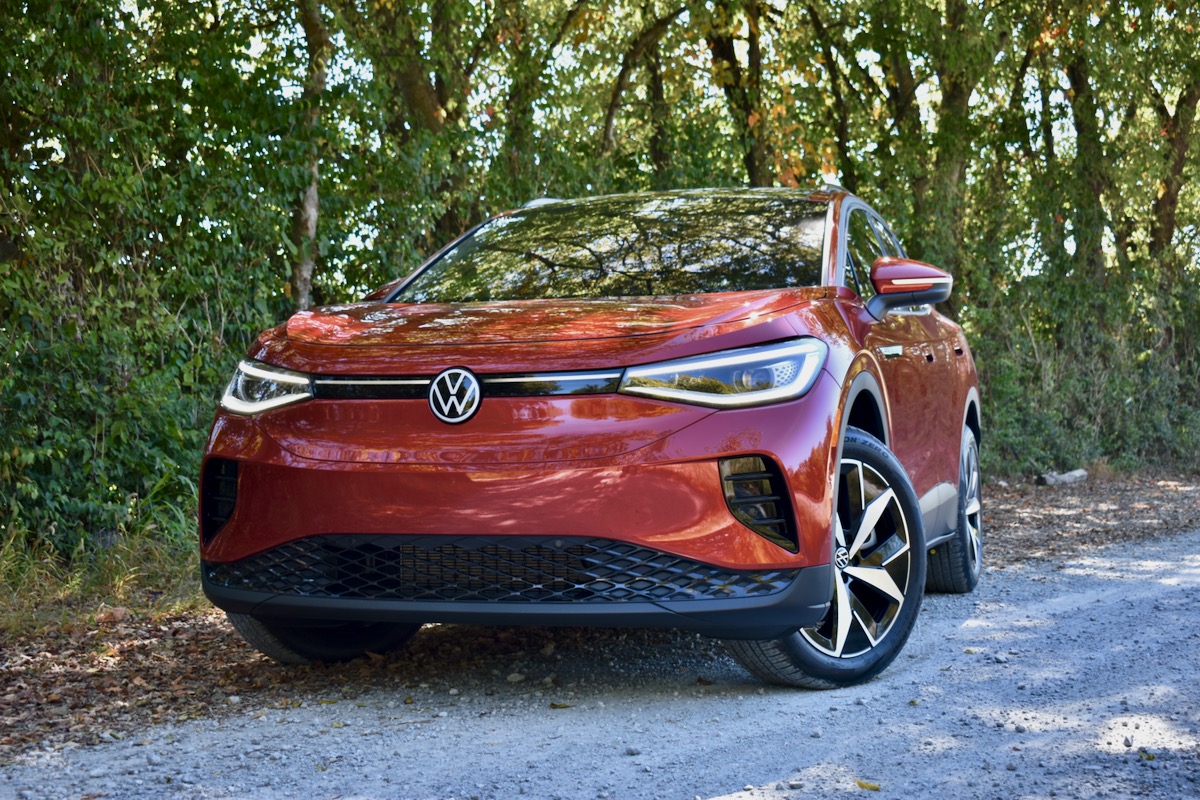
According to CarGurus experts, the overall rating for the 2023 Volvo XC40 is 7.5 out of 10, while the 2023 Volkswagen ID.4 scores 7.8 out of 10. Based on these ratings, the Volkswagen ID.4 is the better choice. With its superior space, impressive technology, and a higher overall expert score, it offers more value and practicality, especially for those venturing into the electric vehicle market.
Choose the 2023 Volvo XC40 if:
- You prioritize a refined ride and build quality that rivals higher-end luxury models.
- You seek a minimalistic, Scandinavian-inspired interior design.
- Safety features and a strong reputation for safety are top priorities.
Choose the 2023 Volkswagen ID.4 if:
- You want a practical, spacious EV with significant cargo room and interior space.
- You appreciate modern tech features, including a large touchscreen and effective voice recognition.
- Comprehensive standard driver-assistance features are essential.
CarGurus highlights

According to CarGurus experts, the overall rating for the 2023 Volvo XC40 is 7.5 out of 10, while the 2023 Volkswagen ID.4 scores 7.8 out of 10. Based on these ratings, the Volkswagen ID.4 is the better choice. With its superior space, impressive technology, and a higher overall expert score, it offers more value and practicality, especially for those venturing into the electric vehicle market.
Choose the 2023 Volvo XC40 if:
Shop Now- You prioritize a refined ride and build quality that rivals higher-end luxury models.
- You seek a minimalistic, Scandinavian-inspired interior design.
- Safety features and a strong reputation for safety are top priorities.
Choose the 2023 Volkswagen ID.4 if:
Shop Now- You want a practical, spacious EV with significant cargo room and interior space.
- You appreciate modern tech features, including a large touchscreen and effective voice recognition.
- Comprehensive standard driver-assistance features are essential.

By: CarGurus + AI
At CarGurus, our team of experienced automotive writers remain at the heart of our content operation, conducting hands-on car tests and writing insightful guides that are backed by years of industry experience. To complement this, we are harnessing AI to make our content offering more diverse and more helpful to shoppers than ever. To achieve this, our AI systems are based exclusively on CarGurus content, ratings and data, so that what we produce is both unique to CarGurus, and uniquely helpful to car shoppers.





